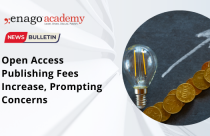“Publish and Read” Gains Momentum: Projekt DEAL Signs Agreement With Springer Nature

You can also listen to this article as an audio recording.
A consortium of more than 700 German Research Institutions and Libraries – known as Projekt DEAL – have signed an agreement with Springer Nature to make their research open access. This has turbocharged the open access movement. Imagine if all published research was open access? Free access to publications helps accelerate your research, enriches education, and allows you (taxpayer) to read the research you inadvertently funded. Does this sound important to you?
Another recent initiative which you have already heard about is Plan S. Plan S intends to make research publicly available as soon as possible to advance science. The deal with Springer Nature is another initiative of the same Open Access movement.
What the Springer Nature Agreement Means
Projekt DEAL feels strong inclination towards open access. Hence, they have spent more than 3 years negotiating with major publishers. Their agreement with Springer Nature is applicable on German authors, working at institutions that are part of Projekt DEAL. According to the deal, they can publish “open access” in all of Springer Nature’s journals. However, this agreement does not include Nature and its sister Nature brand journals. It also excludes magazines such as Scientific American.
Although the Nature brand journals have high impact factors and publication in them is highly prestigious, they make up a small percentage of Springer Nature’s journals. Authors will still be allowed to publish their work in these journals; however, they will have to provide motivation to do so.
In the Projekt DEAL agreement, Springer Nature will recoup costs through publication fees from the author, rather than subscriptions from readers. In addition, institutions that are members of Projekt DEAL will have online access to approximately 2,500 Springer Nature journals as well as archives going back to 1997.
This deal is similar to the agreement that Project DEAL reached with Wiley in February this year. Articles by German scientists, whose research institutions are part of Projekt DEAL, will be made freely available. In addition, Project DEAL members will have access to Wiley’s journals going back to 1997, for an annual fee.
Springer Nature Agreement Fine Print
- The fee structure that the parties agreed to aims to make publication costs more balanced across different research institutions. Research institutions will pay per article published. Therefore, the more an institution publishes, the more they will have to pay. This means that smaller institutions who do not publish as much, will carry proportionally lower costs for information.
Gerard Meijer of Projekt Deals’ negotiating team said, “It was wrong in the past that the smaller universities that hardly did any research…need[ed] to have a library budget to read what others did.”
- Another exciting element of the agreement is that Projekt DEAL institutions will receive a discount for print copies of the journals.
- Publishing in Wiley and Springer journals via this open access model is restricted to Research Institutions that are part of Projekt DEAL. Therefore, only papers whose corresponding author works at one of the Projekt DEAL Research Institutions can benefit from the agreement.
- The agreement starts in 2020 and will run for 2 – 3 years.
- As mentioned above, this victory does not extend to the Nature brand journals and the Scientific American
With many complex factors to consider, we can now understand why the deal took 3 years to negotiate.
Since the aim of publishing in open access journals is for your work to reach as many researchers as possible, these closed journals may no longer be appealing options.
Turbocharging the Research Community
Leo Waaijers from the Delft University of Technology in the Netherlands says “Projekt DEAL [negotiators] seem to aim at a win-win for both parties.”
This is because the publishers still get paid for their publication, and research institutions get more open access to journal articles.
Robert-Jan Smits from the European Commission’s special envoy on open access in Geneva, Switzerland seemed to consider this day as a great day for German science, European science, and global science.
Spokesman for Projekt DEAL, Professor Hippler feels this is a positive move for researchers. According to him, it is in the general interest of the scientist that everything he or she publishes can be read by anyone in the world.
The more your research is read and cited, the more exposure your work gets. This is good for your field of research and your career.
The Projekt DEAL – Springer Nature agreement is the largest open access agreement to date. I am sure you have experienced literature searches in which you find the perfect paper, only to find you can only access the abstract. Purchasing the article is often unaffordable. Imagine the impact these open-access agreements will have on young researchers. Their frustrations in the future will be due to the more relevant aspects of research experiments, rather than trying to access information they cannot afford to buy.
Will Other Publishers Join the Move?
Springer Nature and Wiley seem prepared to move with the times in the best interests of science. The Projekt DEAL agreement with Wiley and Springer Nature proves to be a sustainable solution for both parties. However, Elsevier have not agreed to this concept.
Other groups are putting pressure on Elsevier to change their subscription model. For example, in protest against Elsevier, the Max Planck Society will not renew its contract with this publishing house after it expires. The Max Planck Society’s support was further displayed when 13 of their scientists stepped down as editors and advisors of the Elsevier journal board in support of Projekt DEAL.
Academic publishing is changing rapidly. Do you think the remaining large publisher, Elsevier, will come to the party? Let’s take a vote, if you think they will, please tell us in the comments section below by saying “yes” or “no”. If you say “yes”, tell us how soon you think they may come to an agreement with Projekt DEAL.









